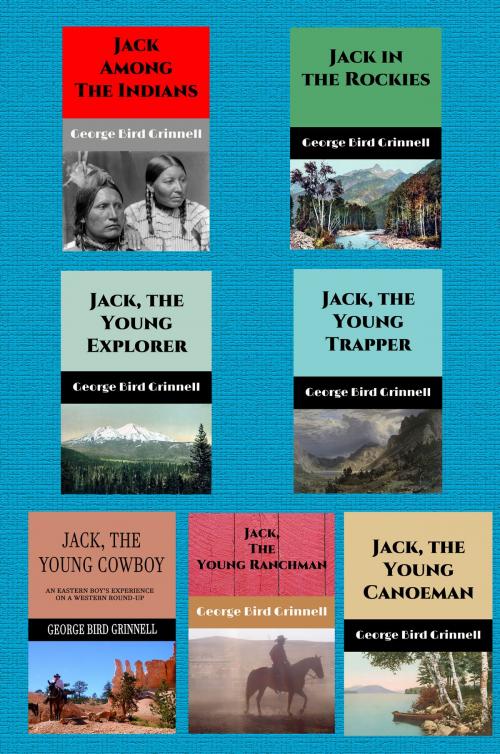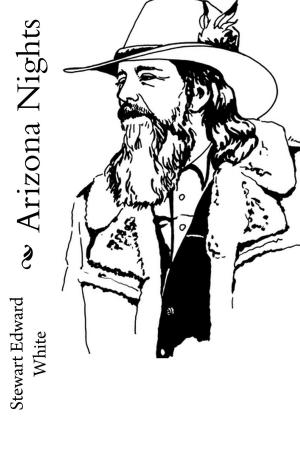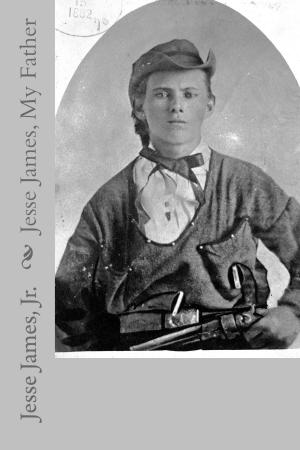Jack, the Young Man: The Action-Adventure Series
Fiction & Literature, Anthologies, Westerns, Action Suspense| Author: | George Bird Grinnell | ISBN: | 1230002719863 |
| Publisher: | Steve Gabany | Publication: | October 21, 2018 |
| Imprint: | Language: | English |
| Author: | George Bird Grinnell |
| ISBN: | 1230002719863 |
| Publisher: | Steve Gabany |
| Publication: | October 21, 2018 |
| Imprint: | |
| Language: | English |
JACK, THE YOUNG MAN: THE ACTION-ADVENTURE SERIES
The seven-volume set from George Bird Grinnell stands as one of the premier collections of life on the western ranch, in the western and northwestern mountains, and among a number of Native American tribes in the northwest U.S. and Canada. Long after his death, Grinnell continues to be acknowledged as one of the most prominent authorities on these subjects, and his work on the first peoples remains the foundation for many researchers across the globe. That he was able to translate this knowledge into eminently-readable and exciting novels for young adults as well as adult readers is simply remarkable.
These seven novels are from the original, unabridged editions, published by Frederick A. Stokes Company, in New York, from 1899 - 1913. All seven include the original, rejuvenated illustrations and, where available, the original cover art.
"To me these books are like a light at night to any creature. They continue to attract me and I have read them again and again, for they bring back the past in wonderful way to the men who have traveled the plains and scaled the mountains which tower bold blue above them."
- JACK, THE YOUNG RANCHMAN: A BOY'S ADVENTURE IN THE ROCKIES
Tells of the far West in the days of the buffalo and wild Indian. The ranch was in a great basin surrounded by the Rocky Mountains. Other books in the series are Jack Among The Indians, Jack In The Rockies, Jack The Young Canoeman, Jack The Young Trapper, Jack The Young Explorer, and Jack The Young Cow-Boy.
- JACK AMONG THE INDIANS: A BOY'S SUMMER ON THE BUFFALO PLAINS
Jack, a young Eastern boy, is put in the charge of Hugh Johnson, an old plainsman, and makes a horseback journey from the lower range up across Wyoming and Montana to the camp of the Piegans, above the Missouri River, where he spends a part of one summer living as the Indians live. He kills mountain sheep, deer, antelope and buffalo; saves the life of an Indian girl; kills a bear; and learns to run the buffalo on a bareback horse, and kill buffalo as the Indians did, with the bow and arrow.
- JACK IN THE ROCKIES: A BOY'S ADVENTURES WITH A PACK TRAIN
Young people will be fascinated by the description of the wild life in the Yellowstone region and the daily experiences of the party. There is no scalping and torturing and very little fighting, and the only tragical element in the book is in the last chapter when they discover a band of stolen horses, including some of their own, resteal them, and are of course pursued by the thieves. "Black" Dowling dies.
- JACK, THE YOUNG CANOEMAN: AN EASTERN BOY'S VOYAGE IN A CHINOOK CANOE
Published in 1906 by Frederick A. Stokes, this is all about adventures in the Northwest, including a canoe trip along the coast of British Columbia, a hunt in the mountains, and a trip up the Fraser river in the time of the salmon fishing.
- JACK, THE YOUNG TRAPPER: AN EASTERN BOY'S FUR HUNTING IN THE ROCKY MOUNTAINS
"They were men of firm courage and stern resolution, those trappers of the early days," and Jack Danvers who spends a summer in the Colorado park region, is taught some of the secrets of that now forgotten life by one who had borne a part in the work of subduing the wild West. He learns much of Indian beaver lore of methods of trapping and of camp life in general.
- JACK, THE YOUNG EXPLORER: A BOY'S EXPERIENCES IN THE UNKNOWN NORTHWEST
In northern Montana among the Blackfoot Indians, Jack sees a medicine pipe ceremony, learns of old time hunting ways, and explores the unknown mountain region above the head-waters of St Mary's river and Swift current.
- JACK, THE YOUNG COWBOY: AN EASTERN BOY'S EXPERIENCE ON A WESTERN ROUND-UP
The final volume in this incredibly-popular series, this one about the "cow country," which is now rapidly passing away. Jack works at all about the duties on a ranch. He joins a round-up camp and learns first-hand about stampedes, cow-ponies, cutting and branding, riding-circle, and the other work of the cowboys.
------------------------
George Bird Grinnell (September 20, 1849 – April 11, 1938) was an American anthropologist, historian, naturalist, and writer. Grinnell was born in Brooklyn, New York, and graduated from Yale University with a B.A. in 1870 and a Ph.D. in 1880. Originally specializing in zoology, he became a prominent early conservationist and student of Native American life. Grinnell has been recognized for his influence on public opinion and work on legislation to preserve the American buffalo.
Grinnell’s books and publications reflect his lifelong study of the northern American plains and the Plains tribes. Along with J. A. Allen and William T. Hornaday, Grinnell was a historian of the buffalo and their relationship to Plains tribal culture. In When Buffalo Ran (1920), he describes hunting and working buffalo from a buffalo horse.
Grinell wrote seven "Jack" books, and a large number of other western fiction and non-fiction works.
JACK, THE YOUNG MAN: THE ACTION-ADVENTURE SERIES
The seven-volume set from George Bird Grinnell stands as one of the premier collections of life on the western ranch, in the western and northwestern mountains, and among a number of Native American tribes in the northwest U.S. and Canada. Long after his death, Grinnell continues to be acknowledged as one of the most prominent authorities on these subjects, and his work on the first peoples remains the foundation for many researchers across the globe. That he was able to translate this knowledge into eminently-readable and exciting novels for young adults as well as adult readers is simply remarkable.
These seven novels are from the original, unabridged editions, published by Frederick A. Stokes Company, in New York, from 1899 - 1913. All seven include the original, rejuvenated illustrations and, where available, the original cover art.
"To me these books are like a light at night to any creature. They continue to attract me and I have read them again and again, for they bring back the past in wonderful way to the men who have traveled the plains and scaled the mountains which tower bold blue above them."
- JACK, THE YOUNG RANCHMAN: A BOY'S ADVENTURE IN THE ROCKIES
Tells of the far West in the days of the buffalo and wild Indian. The ranch was in a great basin surrounded by the Rocky Mountains. Other books in the series are Jack Among The Indians, Jack In The Rockies, Jack The Young Canoeman, Jack The Young Trapper, Jack The Young Explorer, and Jack The Young Cow-Boy.
- JACK AMONG THE INDIANS: A BOY'S SUMMER ON THE BUFFALO PLAINS
Jack, a young Eastern boy, is put in the charge of Hugh Johnson, an old plainsman, and makes a horseback journey from the lower range up across Wyoming and Montana to the camp of the Piegans, above the Missouri River, where he spends a part of one summer living as the Indians live. He kills mountain sheep, deer, antelope and buffalo; saves the life of an Indian girl; kills a bear; and learns to run the buffalo on a bareback horse, and kill buffalo as the Indians did, with the bow and arrow.
- JACK IN THE ROCKIES: A BOY'S ADVENTURES WITH A PACK TRAIN
Young people will be fascinated by the description of the wild life in the Yellowstone region and the daily experiences of the party. There is no scalping and torturing and very little fighting, and the only tragical element in the book is in the last chapter when they discover a band of stolen horses, including some of their own, resteal them, and are of course pursued by the thieves. "Black" Dowling dies.
- JACK, THE YOUNG CANOEMAN: AN EASTERN BOY'S VOYAGE IN A CHINOOK CANOE
Published in 1906 by Frederick A. Stokes, this is all about adventures in the Northwest, including a canoe trip along the coast of British Columbia, a hunt in the mountains, and a trip up the Fraser river in the time of the salmon fishing.
- JACK, THE YOUNG TRAPPER: AN EASTERN BOY'S FUR HUNTING IN THE ROCKY MOUNTAINS
"They were men of firm courage and stern resolution, those trappers of the early days," and Jack Danvers who spends a summer in the Colorado park region, is taught some of the secrets of that now forgotten life by one who had borne a part in the work of subduing the wild West. He learns much of Indian beaver lore of methods of trapping and of camp life in general.
- JACK, THE YOUNG EXPLORER: A BOY'S EXPERIENCES IN THE UNKNOWN NORTHWEST
In northern Montana among the Blackfoot Indians, Jack sees a medicine pipe ceremony, learns of old time hunting ways, and explores the unknown mountain region above the head-waters of St Mary's river and Swift current.
- JACK, THE YOUNG COWBOY: AN EASTERN BOY'S EXPERIENCE ON A WESTERN ROUND-UP
The final volume in this incredibly-popular series, this one about the "cow country," which is now rapidly passing away. Jack works at all about the duties on a ranch. He joins a round-up camp and learns first-hand about stampedes, cow-ponies, cutting and branding, riding-circle, and the other work of the cowboys.
------------------------
George Bird Grinnell (September 20, 1849 – April 11, 1938) was an American anthropologist, historian, naturalist, and writer. Grinnell was born in Brooklyn, New York, and graduated from Yale University with a B.A. in 1870 and a Ph.D. in 1880. Originally specializing in zoology, he became a prominent early conservationist and student of Native American life. Grinnell has been recognized for his influence on public opinion and work on legislation to preserve the American buffalo.
Grinnell’s books and publications reflect his lifelong study of the northern American plains and the Plains tribes. Along with J. A. Allen and William T. Hornaday, Grinnell was a historian of the buffalo and their relationship to Plains tribal culture. In When Buffalo Ran (1920), he describes hunting and working buffalo from a buffalo horse.
Grinell wrote seven "Jack" books, and a large number of other western fiction and non-fiction works.















